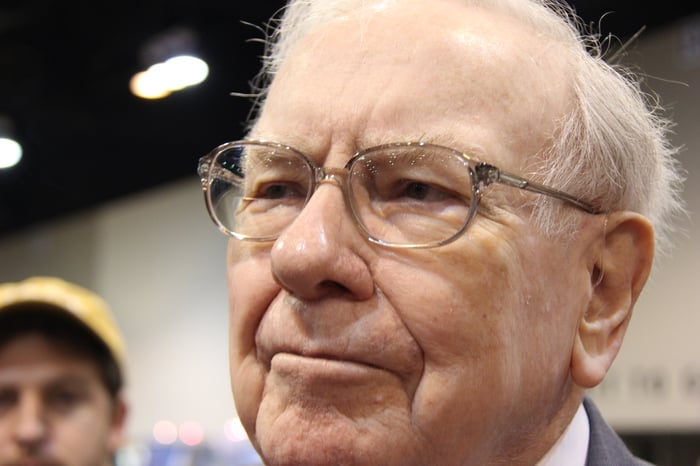Buffett’s Challenge with Berkshire Hathaway: Seeking Growth Opportunities
Warren Buffett faces a significant challenge with Berkshire Hathaway (NYSE: BRK.A) (NYSE: BRK.B): its sheer size limits the investment opportunities available in the stock market. This issue is not new; Buffett acknowledged this in his 1995 letter to shareholders, stating, “The giant disadvantage we face is size: In the early years, we needed only good ideas, but now we need good big ideas.”
Over the past thirty years, this problem has intensified as Buffett now oversees more than $600 billion in investable assets for Berkshire Hathaway, a dramatic increase from $26 billion in 1995. In a recent statement, Buffett remarked, “There remain only a handful of companies in this country capable of truly moving the needle at Berkshire.”

Image source: The Motley Fool.
Buffett’s challenge lies partially in the fact that many of the most attractive investment opportunities are in smaller companies. His portfolio decisions over the last two years reflect this trend, with significant sales of large-cap stocks while focusing on smaller companies, typically valued between $15 billion and $50 billion.
However, investors still have a universe of opportunities available among companies with market capitalizations below even the smallest that Berkshire can engage with. Here are three stocks worth considering.
1. Dutch Bros
Dutch Bros (NYSE: BROS) is a coffee chain strategically positioned to leverage consumer behaviors in the 2020s. Its drive-thru-only model is designed to maximize beverage output during peak hours. The shift in focus by Starbucks toward faster service and pick-up orders underscores the growing trend that Dutch Bros is tapping into.
At this stage, Dutch Bros is still in its growth phase and is employing several strategies to expand. First, its loyalty program is thriving; Dutch Rewards members accounted for 71% of sales in Q4, a notable increase from the previous year. Strong engagement with its rewards program and mobile app has fueled mobile ordering, which is now available in 96% of locations. This uptick is enhancing customer retention and improving service efficiency.
Second, the company is aggressively opening new stores. By the end of 2024, it had expanded to 982 locations—an 18% increase from the prior year. They aim to more than double this figure by 2029 while also cutting future capital costs per new unit from $1.7 million to $1.25 million. Management anticipates a payback period of just over two years for these new outlets.
Finally, Dutch Bros is exploring menu diversification by adding food options to increase its average ticket size. However, introducing too many items may reduce service speed, creating longer wait times that could deter customers. Striking the right balance could attract new clientele and enhance same-store sales growth.
Despite its current valuation of around $7 billion, Dutch Bros stock is trading at a relatively high enterprise value-to-EBITDA multiple of 27 based on forward-looking expectations. Nevertheless, its promising growth trajectory may justify this price for investors.
2. Roku
Roku (NASDAQ: ROKU) operates the leading connected-TV operating system in the United States. As streaming service consumption continues to rise, Roku’s user engagement has also surged. By the end of 2024, nearly 90 million households were streaming more than four hours daily on the platform.
While Roku is widely recognized for its streaming devices and branded TVs, its primary revenue comes from advertising. The company earns income from ads on its home screen, its Roku Channel, and through negotiated advertising agreements with other streaming services.
In its dominant position as the leading TV operating system, Roku wields significant negotiating power with media companies for distribution agreements. This leverage results in improved advertising rates and revenue shares, bolstering robust gross margins for Roku’s business.
Roku has much room for expansion. Its recent entries into Canadian and Mexican markets have proven successful, establishing strong positions. However, it still has growth potential in Europe and Latin America, where it has just begun developing its presence. Building relationships with TV manufacturers and retailers in these regions will take time, but success can follow its North American strategy.
The current enterprise value of Roku stock is about 19 times analysts’ EBITDA expectations, presenting a compelling value given its market capitalization of $8.7 billion.
3. FuboTV
FuboTV (NYSE: FUBO) is a smaller virtual multichannel video programming distributor that ended 2024 with 1.7 million subscribers. The company focuses heavily on streaming live sports, appealing to fans seeking alternatives to traditional cable or satellite TV.
Although significantly smaller than competitors like Walt Disney‘s Hulu + Live TV or YouTube TV, FuboTV gained momentum with a proposed partnership with Disney that would integrate Fubo’s service into Hulu. Under this agreement, Disney would acquire a 70% controlling stake in Fubo, while it remains an independent entity.
Such a close relationship with Disney could be highly advantageous for Fubo. It would likely negotiate better rates for high-demand channels, particularly Disney’s ESPN family, crucial for its sports-centric offerings. Moreover, merging Fubo’s subscriber base with Hulu + Live TV’s could boost its negotiating power with other networks, enhancing its competitive position in the streaming market.
FuboTV Remains Strong with or Without Disney Deal
FuboTV’s partnership with Disney could enhance its market power alongside other media companies. Moreover, Disney’s 70% ownership interest in FuboTV would likely motivate them to ensure strong operational results for the platform.
Even in the event the Disney deal falls short, FuboTV is poised for growth. The company is set to receive $130 million from Disney regardless of the deal’s fate. While FuboTV ended 2024 with a modest cash balance of $161 million, it did achieve its first positive free cash flow in the previous year.
With a current market capitalization of about $1 billion, FuboTV’s operational valuation remains low. By adding the expected $130 million from Disney to its book value, the company’s stock trades at just three times its book value. If the entire $220 million is received as part of the Disney agreement, the valuation multiple drops to 2.4. Should FuboTV maintain its positive free cash flow trend, the multiple could reduce even further. For many investors, this makes FuboTV a small-cap stock worth further investigation.
Should You Invest $1,000 in Dutch Bros Now?
Before deciding to invest in Dutch Bros, take a moment to consider the following:
The Motley Fool Stock Advisor analyst team has highlighted what they believe to be the 10 best stocks for investors today, and Dutch Bros is not part of this selection. The recommended stocks have the potential for significant returns in the upcoming years.
For example, consider when Netflix made the list on December 17, 2004. If you invested $1,000 at that recommendation, you’d have $524,747!*
Similarly, when Nvidia was recommended on April 15, 2005, a $1,000 investment would now be worth $622,041!*
It’s noteworthy that Stock Advisor has an average total return of 792%, significantly outperforming the 153% return of the S&P 500 over the same period. Stay informed about the latest top 10 list by joining Stock Advisor.
*Stock Advisor returns as of April 14, 2025
Adam Levy holds positions in Roku, Starbucks, and Walt Disney. The Motley Fool has stakes in and recommends Berkshire Hathaway, Roku, Starbucks, Walt Disney, and fuboTV. The Motley Fool also recommends Dutch Bros. They maintain a disclosure policy.
The views and opinions expressed herein are those of the author and do not necessarily reflect those of Nasdaq, Inc.

